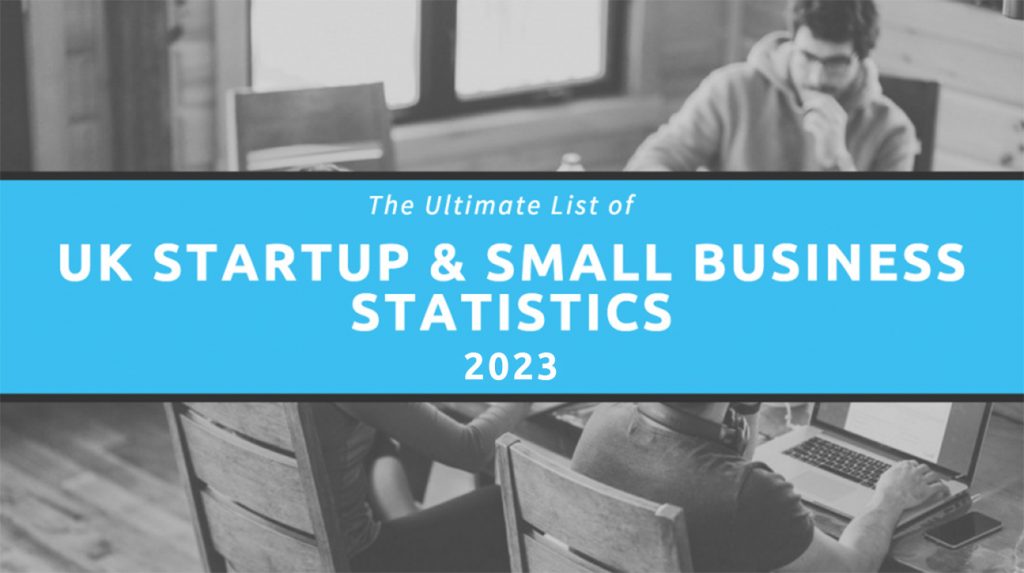
The Ultimate List of UK Startup & Small Business Statistics
*This has been updated for 2023
There’s no doubt that starting a business is one of the most daunting things you can do, not only in your professional career but in your life as a whole!
Most entrepreneurs will be giving up a steady, well paying job to roll the dice and start from scratch as the owner of their own, brand new business.
From huge decisions such as choosing your product or service, target audience and how to raise funds, to more frivolous choices such as which shade of blue your logo will be, there’s plenty to think about!
If you’re reading this article then you’ve probably already seen numerous startup failure rate statistics that so often get shared across national news sites and social media.
However, there’s a whole bunch of positive startup stats too which paint an altogether more rosy picture of becoming your own boss.
Statistics and analysis can also be a great way of understanding the current state of the UK startup scene and identifying potential pitfalls or areas of opportunity.
It’s for all these reasons that we’ve produced this ultimate list of startup statistics for you to cast your eye over and gain insight from.
Reasons for Starting Up 
In this section we take a look at the most common reasons that UK entrepreneurs start their own business, what inspires them to do so as well as what holds people back.
- 64% of UK workers wants to set up a business (SME Loans, 2019)
- 83% of 18-24 year olds have ambitions of self-employment (SME Loans, 2019)
- More males (69%) have ambitions to start up than women (56.4%) (SME Loans, 2019)
- Over ⅓ of the UK workforce don’t enjoy their job (SME Loans, 2019)
- The age group most driven by financial gain are 18-24 year olds (SME Loans, 2019)
- 1 in 3 UK workers want flexible working hours and have the option to work from home (SME Loans, 2019)
- 43% of aspiring entrepreneurs don’t think they will ever set up their company (SME Loans, 2019)
- ¼ of aspiring UK entrepreneurs are put off by ‘fear of stress’ (SME Loans, 2019)
- ⅓ of aspiring UK entrepreneurs would like to set up business with their husband or wife
- Only 13% of UK workers would choose their best friend as a business partner
- 39% of young entrepreneurs saw lack of access to funding as a major barrier to growth (Institute of Directors, 2016)
“⅓ of aspiring UK entrepreneurs would like to set up business with their husband or wife”
Startup Failure Stats 
Startup failure statistics are the most shared startup stats online. Take a look at some of the damning startup failure statistics below which shows just how hard it can be going alone.
- Fewer than half of UK Startups make it beyond 5 years (GOV.UK, 2019)
- 60 % of new businesses will go-under within three years (Telegraph, 2019)
- 20% of new businesses will close their doors within just 12 months (Telegraph, 2019)
- Nearly 1 in 5 new businesses fail in the UK each year (Buisness4Beginners, 2023)
- Between 2020 and 2021, 390,000 businesses failed (money, 2023)
“20% of new businesses will close their doors within just 12 months”
Startup Success Stats 
Don’t believe all the negative headlines. There’s more than enough small business success stats to reveal that UK businesses are still thriving.
- 1 company is formed every minute in the UK (GOV.UK, 2019)
- 89% of UK startups survive their first year (ONS, 2019)
- There were 5.8 million small businesses at the start of 2019, up from 5.7 million in 2018 (despite Brexit concerns) and up from 5.5 million in 2017. (GOV.UK, 2019)
- The number of small businesses in the UK has increased every year since the year 2000 and is expected to do so throughout the ‘20’s’. (GOV.UK, 2019)
- Before the pandemic, nearly eight out of ten SMEs reported that they were making a profit each year (money, 2023)
“1 company is formed every minute in the UK”
Startup Funding Stats 
Startup funding or ‘capital’ is the money required to get a new company on its feet and turn an idea into a business. Startup funding can come from a variety of avenues such as personal savings, friends & family, loans, crowd funding and more.
- 2017 was a record high year for UK startup funding (Beauhurst, 2019)
- The total invested in UK startup companies dropped 15pc from £8.27 billion to £7 billion in 2018 amid Brexit fears (Beauhurst, 2019)
- 82% of Startups used Self Funding to start their business (Institute of Directors, 2016)
- 56% of Startups use self funding as their only source (Institute of Directors, 2016)
- 74% of startups used just one source of funding to start their business (Institute of Directors, 2016)
- On average, $10,000 are borrowed when starting up (moneyzine, 2023)
“74% of startups used just one source of funding to start their business”
Startup Stats By Sector 
Startup statistics differ greatly by sector and it’s important to seek out industry specific figures when making predictions or forecasts.
- 99.9% of all private sector businesses in the UK are SMEs (GOV.UK, 2019)
- 69% of service based businesses have a startup budget below £5,000 (Institute of Directors, 2016)
- 67% of creative businesses have a startup budget below £5,000 (Institute of Directors, 2016)
- 75% of recruitment companies have a startup budget over £10,000 (Institute of Directors, 2016)
- 75% of finance businesses have a startup budget over £10,000 (Institute of Directors, 2016)
- In the private sector, SMEs account for 61% of employment (startups, 2022)
“99.9% of all private sector businesses in the UK are SMEs”
Startup Stats By Location 
Startup stats that focus on location tell a very interesting story about the current state of funding, entrepreneurship and wealth across different areas of the UK. As you’d expect, London is the home of the startup but is that changing?
- London is above the national average for businesses, 1,563 businesses for every 10,000 adult residents (GOV.UK, 2019)
- In the UK, there are 1,059 businesses per 10,000 residents (GOV.UK, 2019)
- London (1.1 million) and the South East (940,000) had the most private sector businesses, accounting for 35% of the UK business population (GOV.UK, 2019)
- The North East had the lowest private sector businesses of any English region with just 152,000 (GOV.UK, 2019)
- One in three businesses are in London or the South East. (GOV.UK, 2019)
“One in three businesses are in London or the South East”
Owner Profile 
What does the standard small business owner in the UK look like and how does this differ to the rest of the world? Startup owner profile stats can highlight notable trends on age, race, gender, education and more.
- The majority of UK entrepreneurs are in their 40’s (Startups)
- Only 14% of UK SMEs are woman-led (Startups)
- Just 11% of Startup owners have no educational qualifications (Startups)
- Only 8% of UK small business employers are MEG-led; that is led by a member of a minority ethnic group (Startups)
- Small businesses in London are more likely to be minority ethnic group-led, at 22%, compared to 8% overall. (Startups)
- Over 95% of small business owners don’t have a basic understanding of how search engines work (Institute of Directors, 2016)
“Over 95% of small business owners don’t have a basic understanding of how search engines work”
Sources
- https://www.ons.gov.uk/businessindustryandtrade/business/activitysizeandlocation/bulletins/businessdemography/2018
- https://www.gov.uk/government/news/uk-company-statistics-2018-to-2019
- https://www.gov.uk/government/statistics/business-population-estimates-2019
- https://startups.co.uk/the-average-entrepreneur/
- https://smeloans.co.uk/64-percent-of-britains-workforce-want-to-start-a-business/
- https://www.thecompanywarehouse.co.uk/downloads/2016-uk-startup-funding-report.pdf
- https://moneyzine.com/startup-resources/small-business-statistics/
- https://www.business4beginners.co.uk/uk-small-business-statistics/
- https://www.money.co.uk/business/business-statistics/small-business-statistics